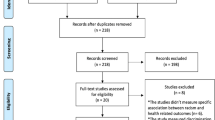Abstract
This qualitative study was carried out to better understand factors that determine the subjective social status of Latin Americans in Spain. The study was conducted following a theoretical framework and forms part of broader study on subjective social status and health. Ten immigrant participants engaged in semi-structured interviews, from which data were collected. The study results show that socioeconomic aspects of the crisis and of policies adopted have shaped immigrant living conditions in Spain. Four major themes that emerged from the analysis were related to non-recognition of educational credentials, precarious working conditions, unemployment and loneliness. These results illustrate the outcomes of current policies on health and suggest a need for health professionals to orient practices toward social determinants, thus utilizing evaluations of subjective social status to reduce inequalities in health.
Similar content being viewed by others
References
International Organization for Migration. World migration report 2013: Migrant well-being and development—the seventh report in IOM’s World migration report (WMR) series. 2013. http://www.iom.int/cms/wmr2013.
Mladovsky P, Rechel B, Ingleby D, McKee M. Responding to diversity: an exploratory study of migrant health policies in Europe. Health Policy. 2012;105(1):1–9.
Rechel B, Mladovsky P, Ingleby D, Mackenbach JP, McKee M. Migration and health in an increasingly diverse Europe. Lancet. 2013;381(9873):1235–45.
Royal decree—law 16/2012 of April 20, on urgent measures for guaranteeing the sustainability of the National System of Health and improving the quality and safety of it is services (in Spanish). http://www.boe.es/boe/dias/2012/04/24/pdfs/BOE-A-2012-5403.pdf.
Davies A, Basten A, Frattini C. Migration: A social determinant of the health of migrants. 2006. http://ec.europa.eu/ewsi/UDRW/images/items/docl_9914_392596992.pdf.
Marmot M. Status syndrome. A challenge to medicine. JAMA. 2006;295(11):1304–7.
Adler N, Stewart J. Health disparities across the lifespan: meaning, methods, and mechanisms. Ann N Y Acad Sci. 2010;1186:5–23.
Adler N, Singh-Manoux A, Schwartz J, Stewart J, Matthews K, Marmot M. Social status and health: a comparison of British civil servants in Whitehall-II with European- and African-Americans in CARDIA. Soc Sci Med. 2008;66(5):1034–45.
Wolff LS, Subramanian S, Acevedo-Garcia D, Weber D, Kawachi I. Compared to whom? Subjective social status, self-rated health, and referent group sensitivity in a diverse US sample. Soc Sci Med. 2010;70(12):2019–28.
de Castro AB, Gee GC, Takeuchi DT. Examining alternative measures of social disadvantage among Asian Americans: the relevance of economic opportunity, subjective social status, and financial strain for health. J Immigr Minor Health. 2010;12(5):659–71.
Adler N, Stewart J. The MacArthur scale of subjective social staus. 2007. http://www.macses.ucsf.edu/research/psychosocial/subjective.php.
Singh-Manoux A, Adler N, Marmot MG. Subjective social status: its determinants and its association with measures of ill-health in the Whitehall II study. Soc Sci Med. 2003;56(6):1321–33.
Singh-Manoux A, Marmot M, Adler N. Does subjective social status predict health and change in health status better than objective status? Psychosom Med. 2005;67(6):855–61.
Sanchón-Macias MV. Influence of subjective social status on the health of Latin American immigrant women residing in the Community of Cantabria (in Spanish). Doctoral thesis. University of the Balearic Islands, Spain. 2013. http://www.tesisenred.net/handle/10803/97301.
Strauss A, Corbin J. Bases of qualitative research: techniques and procedures for developing grounded theory. Colombia: Universidad de Antioquia; 2002 (in Spanish).
Calderón C, Fernandez de Sanmamed MJ. Qualitative research in primary care. In: Martin ZA, Cano PJF, editors. Primary care: concepts, organization, and clinical practice. 6th ed. Barcelona: Elsevier; 2008. p. 211–40 (in Spanish).
National Institute of Statistics. Basic demographic indicators. Series 2002–2011. Data valid until 18 June 2013 (in Spanish). Spain. http://www.ine.es/daco/daco42/idb/idb.htm.
Sanchón-Macias MV, Prieto-Salceda D, Bover-Bover A, Gastaldo D. Relationship between subjective social status and perceived health among Latin American immigrant women. Rev Lat Am Enfermagem. 2013;21(6):1353–9.
Operario D, Adler N, Williams D. Subjective social status: reliability and predictive utility for global health. Psychol Health. 2004;19(2):237–46.
Franzini L, Fernandez-Esquer M. The association of subjective social status and health in low-income Mexican-origin individuals in Texas. Soc Sci Med. 2006;63(3):788–804.
Cundiff JM, Smith TW, Uchino BN, Berg CA. Subjective social status: construct validity and associations with psychosocial vulnerability and self-rated health. Int J Behav Med. 2013;20(1):148–58.
Labonté R, Schrecker T. Globalization and social determinants of health: promoting health equity in global governance (part 3 of 3). Glob Health. 2007;3:7.
Navarro V. Neoliberalism as a class ideology; or, the political causes of the growth of inequalities. Int J Health Serv. 2007;37(1):47–62.
Guruge S, Khanlou N, Gastaldo D. Intimate male partner violence in the migration process: intersections of gender, race and class. J Adv Nurs. 2010;66(1):103–13.
World Health Organization. World conference on social determinants of health. Closing the gap: policy into practice on social determinants of health. 2011. http://www.who.int/sdhconference/discussion_paper/en/.
Benach J, Muntaner C, Tarafa G, Valverde C. Social services are on sale and so is our health. Barcelona: Icaria; 2012 (in Spanish).
Cortés I, Gonzalez B. The economic-financial crisis and health in Spain. Evidence and viewpoints. SESPAS report 2014. Gac Sanit. 2014;28(Suppl 1):1–6 (in Spanish).
Conflict of interest
None.
Author information
Authors and Affiliations
Corresponding author
Rights and permissions
About this article
Cite this article
Sanchón-Macias, M.V., Bover-Bover, A., Prieto-Salceda, D. et al. Determinants of Subjective Social Status and Health Among Latin American Women Immigrants in Spain: A Qualitative Approach. J Immigrant Minority Health 18, 436–441 (2016). https://doi.org/10.1007/s10903-015-0197-x
Published:
Issue Date:
DOI: https://doi.org/10.1007/s10903-015-0197-x




